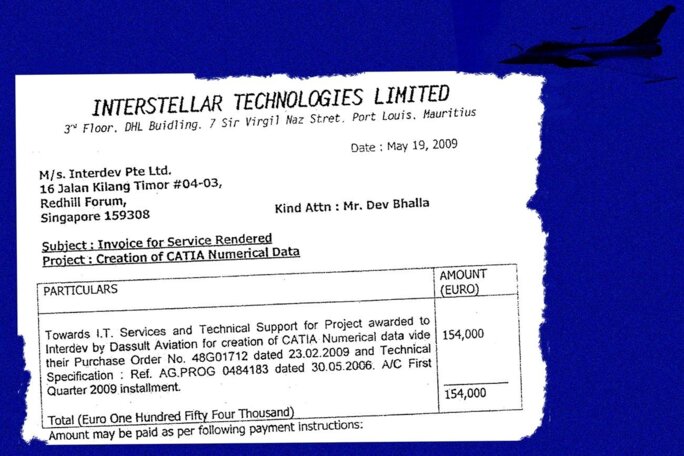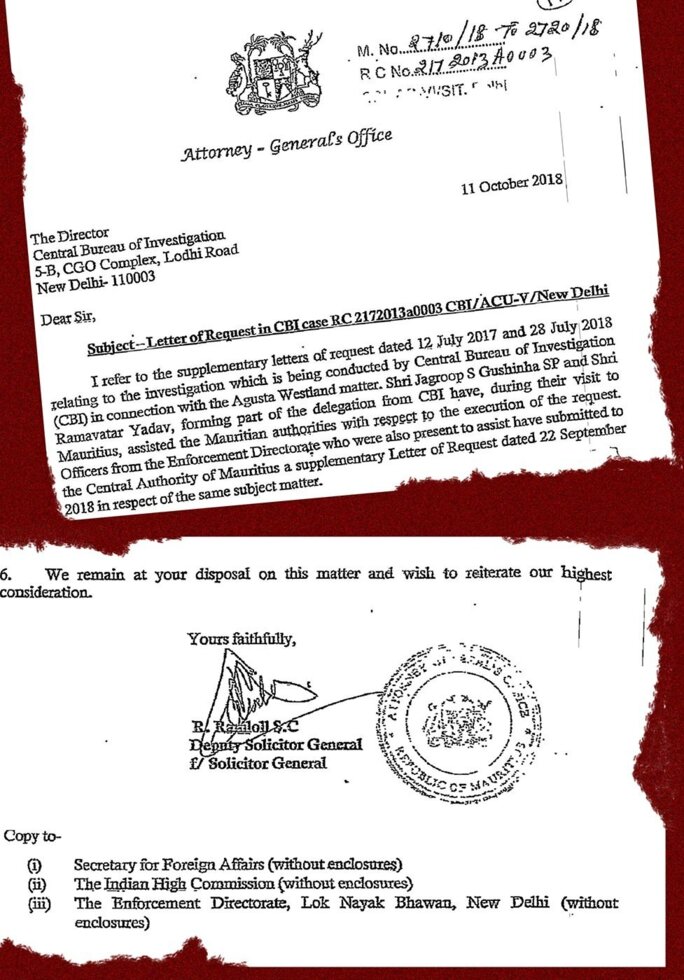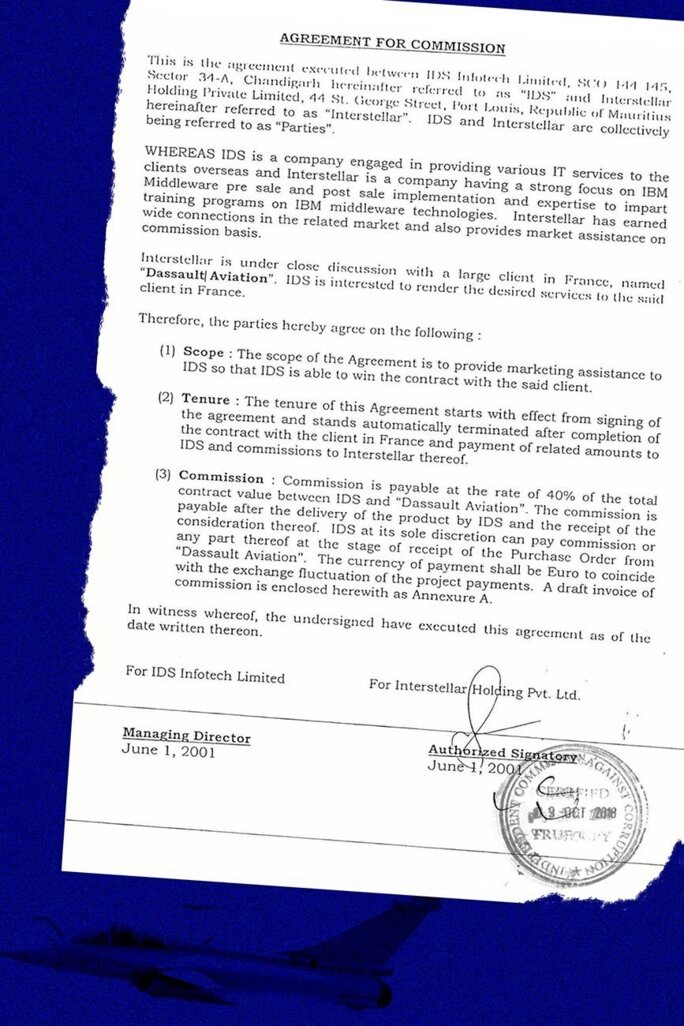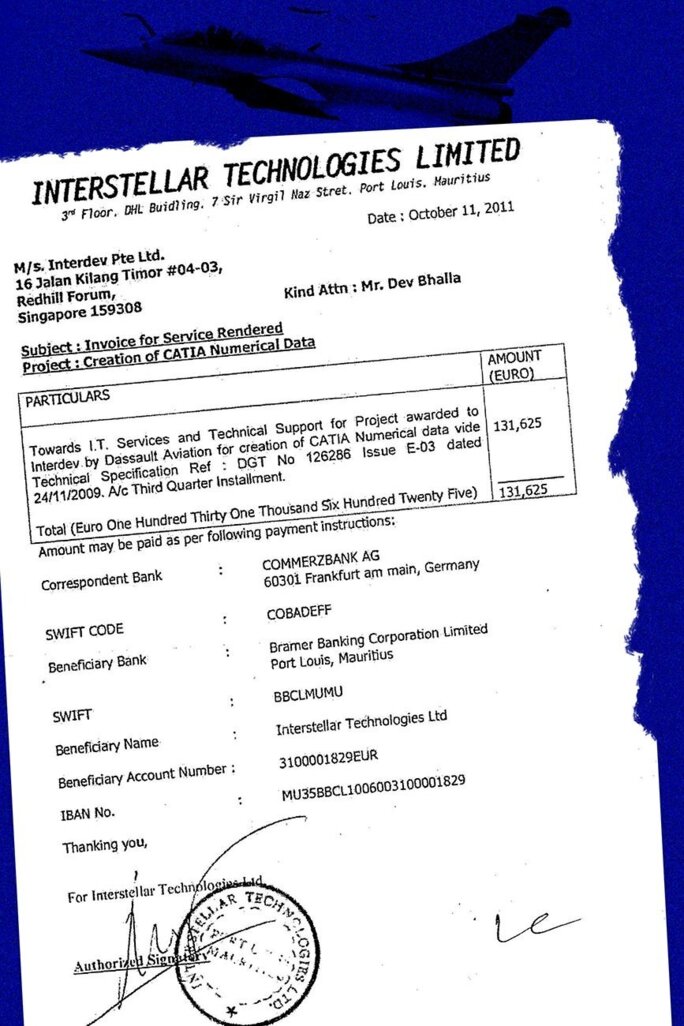It involves offshore companies, dubious contracts and “false” invoices. Mediapart can reveal that detectives from India's federal police force, the Central Bureau of Investigations (CBI), and colleagues from the Enforcement Directorate (ED), which fights money laundering, have had proof since October 2018 that French aviation firm Dassault paid at least 7.5 million euros (equivalent to just under 650 million rupees) in secret commissions to middleman Sushen Gupta. This was in the context of the French firm's long and ultimately successful attempt to secure a 7.8 billion-euro-deal in 2016 to sell 36 of its Rafale fighters to India.
This evidence is contained in confidential documents unearthed in another corruption case being investigated by the two Indian agencies. This is the so-called 'Choppergate' affair, involving a 550-million-euro contract for the sale to India of helicopters manufactured by the Italian-British firm AgustaWestland. Mediapart has had access to the more than 12,000 pages of documents that came out of the CBI's probe into this case, some of which were revealed by the Indian press agency IANS in April this year.

Enlargement : Illustration 1

This information confirms and adds to the revelations in Mediapart's 'Rafale Papers' investigation (see here, here and here). That investigation prompted the opening of a judicial investigation in France in July this year over suspicions of “corruption”, “influence peddling” and “favouritism”. It is being carried out by investigating judges Virginie Tilmont and Pascal Gastineau.
In the helicopter deal, middleman Sushen Gupta received secret commissions from AgustaWestland via a 'letterbox' or shell company registered in Mauritius, Interstellar Technologies Ltd. The Mauritian authorities agreed to send India's Central Bureau of Investigations and Enforcement Directorate numerous documents relating to this company, including contracts, invoices and bank statements.
This was how Indian detectives discovered that Sushen Gupta had also acted as an intermediary for Dassault Aviation over the Rafale deal. His Mauritian company Interstellar Technologies received at least 7.5 million euros from the French aviation firm between 2007 and 2012, thanks to IT contracts that were clearly overbilled, and from which most of the money was discreetly sent to Mauritius using a system of alleged false invoices. Some of these invoices even got the name of the French company wrong, referring instead to 'Dassult Aviation' (see below).

Enlargement : Illustration 2

Questioned by Mediapart, Dassault Aviation and Sushen Gupta did not respond.
The date on which these documents were submitted to the CBI – who then shared them with the Enforcement Directorate – is likely to cause a major stir in India. The Attorney-General's office in Mauritius sent them to the director of the Central Bureau of Investigation in New Delhi on October 11th 2018 (see document below). Just a week earlier, on October 4th, the CBI had received an official complaint over corruption relating to the Rafale deal, deposed by Supreme Court lawyer Prashant Bhushan and Yashwant Sinha and Arun Shouri, both former ministers from the ultra-nationalist Hindu BJP party.

Enlargement : Illustration 3

However, the CBI decided not to open an investigation, even though just seven days after that corruption complaint was filed it received information proving that secret commissions had indeed been paid.
It is true that the corruption complaint and the information from Mauritius concerned different aspects of the case. The Mauritian documents cover the period of the bid process that was eventually won by Dassault (2007 – 2012), a time when the BJP's main political rivals the Congress Party was in power. Whereas the complaint filed on October 4th 2018 targets suspicious activity that took place from 2015, when the deal was being finalised on the authority of the current BJP prime minister Narendra Modi. He is suspected of having favoured businessman Anil Ambani, enabling the latter to pick up subcontracting deals relating to the jet fighters (see more in Mediapart’s previous investigations here and here),
Even so, the accumulation of suspicions, which cover the entire purchase procedure, should have led to the opening of an investigation. Was the case dropped for political reasons? Neither the Central Bureau of Investigations nor the Enforcement Directorate responded to Mediapart's questions on this.
As Mediapart has already revealed in the 'Rafale Papers' investigation, Sushen Gupta was hired as a middleman by Dassault in 2001, after India announced that it wanted to buy fighter jets; the official bid process itself was only launched in 2007.
In order to receive Dassault's payments Sushen Gupta used a proven ploy that had been employed in the helicopter affair, in which he is being investigated for “money laundering” - he denies any wrongdoing. This involved an Indian IT services company, IDS, which obtained clearly overbilled contracts with Dassault, and which in return then had to discreetly pay the middleman.
In a contract dated June 1st 2001, IDS undertook to pay “commission … at the rate of 40% of the total contract value between IDS and 'Dassault Aviation'” to Interstellar Technologies in Mauritius (see document below). A senior figure at IDS told CBI officers that this agreement was drawn up by Gupta's lawyer Gautam Khaitan, who is himself under investigation in the helicopter affair.

Enlargement : Illustration 4

The invoices and bank statements obtained by the CBI show that Sushen Gupta's shell company received 914,488 euros in this way between 2002 and 2006.
Dassault and Gupta soon set up a new and even more opaque financial route to channel payments. The aviation company started buying overbilled IT services through the Singapore-based company Interdev, which was portrayed as the “system integrator for Dassault in Asia”. In reality it was simply a shell company without any real activity, and was managed by a front man for the Gupta family who is today on the run in South Africa.
Under a contract signed in 2004, Interdev was responsible for buying IT services from IDS, and under the cover of subcontracting work it then transferred the vast majority of the money to Interstellar, which was described as a firm that “specialized in software and other IT services”. In reality, Gupta's Mauritian company was another shell company, with neither offices nor staff. It has since been wound up.
According to the bank statements obtained by the CBI, Interdev used this method to pay Interstellar some 6.6 million euros in commissions from Dassault between 2007 and 2012, the period of the bid process for the jet fighter contract.
The transactions that appear on these bank statements, seen by Mediapart, correspond exactly to the payments logged in Sushen Gupta's accounts spreadsheets, which were seized by detectives from the Enforcement Directorate, and whose content Mediapart has revealed during the Rafale Papers investigation. According to these spreadsheets, which cover a longer period than the bank statements, Sushen Gupta received a total of 12.8 million euros from Dassault via Mauritius between 2002 and 2012.
These payments were justified by invoices in which the offshore Singapore-based company Interdev subcontracted to Interstellar the “creation of … numerical data” for “Dassault Aviation” (see document below).

Enlargement : Illustration 5

But according to the CBI's investigations these were fake invoices drawn up by Sushen Gupta's lawyer Gautam Khaitan.
Detectives found Interstellar invoices identical to those discovered by the Mauritian authorities on the computer of an employee of the law firm OP Khaitan & Co, at which Gautam Khaitan is the managing partner. Five of them stated explicitly that the money received by the Mauritian shell company had indeed come from Dassault.
This law firm employee confirmed to the CBI that these were “fake” and “bogus” invoices.
The member of staff said in his statement that lawyer Gautam Khaitan's personal assistant drew the invoices up on his boss's orders. The personal assistant “used to prepare fake invoices on behalf of various companies as per instructions of Gautam Khaitan, and after making/forging signatures on these invoices […], he was sending the invoices to the funds manager of Interstellar Technologies in Mauritius. He was using the email ID of Gautam Khaitan, Interstellar Technologies Ltd and his own email for sending the invoices and instructions for receiving/making payments from the accounts of Interstellar Technologies Ltd.”
Gautam Khaitan did not respond when contacted by Mediapart.
There is an even more disturbing side to the secret commissions; in one document obtained by the Enforcement Directorate, Sushen Gupta suggested that he had handed over money to some Indian officials on Dassault's behalf. “The risk is taken, you have an agent we have paid, now make sure it is legal clean and defendable. […] No money no decisions […] People sitting in office asking for money. […] Those people will, if we don’t pay, put us in Jail,” the middleman wrote in the September 2012 note, as already revealed by Mediapart.
Other documents obtained by Indian detectives show that in 2015, during the final negotiations of the Rafale contract, Sushen Gupta got hold of confidential documents from India's Ministry of Defence detailing the stance of the Indian negotiators, in particular how they calculated the price of the aircrafts. Dassault has refused to comment on these documents. Sushen Gupta did not respond when contacted by Mediapart.
-------------------------
If you have information of public interest you would like to pass on to Mediapart for investigation you can contact us at this email address: enquete@mediapart.fr. If you wish to send us documents for our scrutiny via our highly secure platform please go to https://www.frenchleaks.fr/ which is presented in both English and French.
-------------------------
- The original French version of this article can be found here.
English version by Michael Streeter


